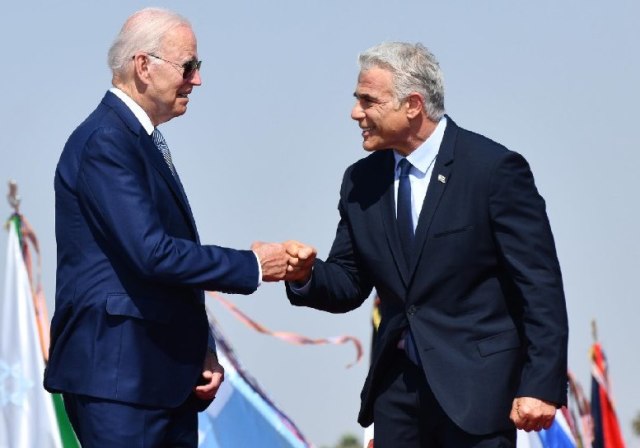Boring, bland but important: 4 reasons Biden was right to visit Israel this week – All Israel News

Here’s my take on what Biden accomplished for America, Israel and the Democratic party
Joel C. Rosenberg | July 15, 2022 AIN

Israeli Prime Minister Yair Lapid greets U.S. President Joe Biden upon his arrival to Israel, July 13, 2022 (Photo: Haim Zach/GPO)
U.S. President Joe Biden’s trip to Israel this week didn’t really make much news in the United States or around the world. The truth is, Biden’s trip was boring and bland, but it was important for four specific reasons:
First, Biden did what Bernie Sanders never would have done. Biden’s visit to Israel immensely reinforced bipartisan support for the U.S.-Israel strategic alliance. It’s hard to picture U.S. Senator Bernie Sanders making a state visit to Israel if he had won the Democratic nomination and the presidency.
Those are two big ifs, but Sanders certainly was a major player and remains a major player in the Democratic Party. Even though Sanders is Jewish, he’s been hostile to Israel in many ways and has formed close working ties with Ilhan Omar, Rashida Tlaib and other very hostile anti-Israel Democratic progressives.
Thus, it is difficult to imagine a Sanders state visit to Israel, had he, in fact, been elected president – or that it would have been bland or boring. But Biden really is the best pro-Israel Democrat in his party.
I have many criticisms of Biden on policy – certainly domestic policy, but also foreign policy. His handling of the Iran nuclear deal comes to mind. His disastrous handling of the Taliban and Afghanistan also comes to mind. And his handling of Vladimir Putin and Ukraine has not been very encouraging either.
Even still, Biden is avowedly pro-Israel. He describes himself as a Zionist, even though he’s not Jewish, and he is the best that the Democratic Party has.
Biden has successfully pushed back the anti-Israel progressives in his party, even pointedly criticizing them this week during his trip to Jerusalem.
That Biden decided, of all 192 countries in the world, to visit Israel; that he would have a very respectful trip; that he would shower praise on the Israeli people and government; that the photo ops would be warm and encouraging; that he would visit Yad Vashem, the Holocaust Remembrance Center in Jerusalem, and make moving remarks there and sit with two Holocaust survivors – all of this was very, very positive.
There was certainly some substance, as well, but nothing particularly newsworthy for Israel or the Middle East.
Biden reaffirmed that he is against Iran getting a nuclear weapon. Well, that’s good. But he’s not doing an awful lot to stop Iran from getting the bomb. So far, the president seems absolutely determined to make some sort of insane nuclear deal with the Iranian regime, with no more guarantees that Iran would keep the deal than they had last time.
Still, with all that, the trip was important because Biden’s visit reinforced the bipartisan nature of the support for the U.S.-Israel strategic alliance.
And that is important.
Israel needs Democrats as well as Republicans to stand with Israel, support Israel, fund Israel, to work with the Americans to develop joint strategic weapons systems, including missile and rocket defense systems.
Second, Biden just gave the Democrats a “Good Housekeeping” seal of approval to the Abraham Accords by dramatically affirming bipartisan support for the historic era of Arab-Israeli peacemaking started under former President Donald Trump. This, too, cannot be over-emphasized.
It really is an important knockout punch of the “peace industry” in Washington, which said that no peace deal could be made between Arab countries and Israel if the Palestinians didn’t make a deal with Israel first or if Israel did not make a deal with the Palestinians.
But we’ve just seen, at the end of the Trump years, that the United Arab Emirates and Bahrain and Sudan and Morocco all were Arab countries that decided to normalize relations with Israel, despite the Palestinians’ continued rejection of normalization with Israel.
That could have been seen just as a Republican initiative, and there was some risk early in Biden’s presidential term that Democrats wouldn’t fully embrace how important the Arab-Israeli peacemaking deals that Trump brokered were.
Obviously, Trump didn’t win a Nobel Peace Prize, and for a while, the Biden team didn’t even want to use the term “Abraham Accords,” but this latter slight has been corrected. Biden has, to his credit, really embraced the Abraham Accords.
On his trip this week to the Middle East, Biden affirmed that Democrats do support the Abraham Accords and want to build on them, as well.
I personally don’t think that Biden has done enough to strengthen those accords, but he did speak of them glowingly this week; he did hold a video summit to meet with Israel, India and the new UAE president, Mohamed bin Zayed Al Nahyan – all of which was good.
Third, Biden’s decision to fly from Israel to Saudi Arabia on a direct flight was important, because it tacitly acknowledges that Biden needs to improve relations with the Saudis proactively, something that we at ALL ISRAEL NEWS and ALL ARAB NEWS have been saying for the last 18 months.
Biden is laying the foundation for a groundbreaking Israeli-Saudi normalization, which is exactly what the region needs and needs soon. Biden’s direct flight to Saudi Arabia was important but not an easy decision, because the president has been so hostile to Saudi Arabia and the Saudi crown prince, the next king, Mohammed bin Salman (MBS).
Biden deserves credit for making the hard decision to say no to those in his party who are vociferously anti-Saudi Arabia and don’t see Saudi Arabia as a strategic American ally. Biden has communicated that the U.S.-Saudi alliance is important, that it should be bipartisan and it should be built upon. This helps both Israel and the U.S.
I will talk more in a different column about the Biden trip to Saudi Arabia, but it’s important to note that, even though Biden’s trip to Israel itself was boring and bland – without huge, groundbreaking news stories or major initiatives announced that no one had expected – the trip was still important.
In part, this was because Biden became the first U.S. president to fly Air Force One directly from Israel to Saudi Arabia. In part, it was because he has been talking often and optimistically about helping Israel and Saudi Arabia normalize their relations.
Fourth, Biden’s decision to meet with Palestinian Authority President Mahmoud Abbas in Bethlehem sent an important signal that the plight of the Palestinian people is important and that it has not been forgotten by Washington or the American people. I do give Biden credit for this.
I have many criticisms of Biden on many issues. But I think it is important for any American president, Biden in this case, to signal to the Palestinian people that they have not been forgotten, and to begin a direct conversation with Abbas that communicates that he needs to change his ways, that he is “a lion in winter.”
It’s late in the game for Abbas. He will not be the leader of the Palestinian people much longer, just because of his health and because he has been serving a four-year position for 17 years. That’s not sustainable. It’s time for a change.
Biden has a lot more opportunity to build trust with Abbas and encourage him to make some very needed reforms inside the P.A., to deal with corruption, to improve security relations with Israel, to improve the economy, to reduce hostility toward Arab-Israeli normalization, and to confront the practice that’s known as “pay-for-slay,” that is paying a salary to Palestinian prisoners who have killed or tried to kill Israeli civilians.
This is a horrible practice; it should be changed. And Abbas needs to stop funding it. It’s wrong. Biden has the opportunity to say these things behind closed doors, while still affirming publicly that the Palestinian people matter and they need a better life.
I think this is important. And I say that as an Israeli. But I also say that as an Evangelical. Jesus told us to love our neighbors. The Palestinians are our neighbors. And I think that it’s not healthy when Christians act as though we only support Israel and the Jewish people, and we show little respect, love or compassion for Palestinians. I have a lot of problems with the Palestinian leadership, but I also believe that God is sovereign and that things can change.
There are enormous tectonic changes going on in the region, as I have described in my book, “Enemies and Allies.” Arab attitudes, in general, towards Israel, towards peace, towards Jews and towards Christians are changing. Attitudes of Arab leaders towards Jews, Christians and Israel are also changing.
And I believe that the Palestinian leadership can change.
I think it’s also important that Biden and his team use not only this opportunity, but also, in the days and weeks and months ahead, other occasions to strongly urge the Palestinian leadership to stop the incitement in the mosques, schools and Palestinian media against Jews, against Israel.
The only way to lay the groundwork is for long-term normalization, peace and quiet, and cooperation between Israelis and Palestinians is to end the incitement and the visceral, anti-Semitic and anti-Israel teachings and rhetoric that are disseminated throughout Palestinian society and begin to say, “Hey, we might not like one another, but we have to live together.” And that’s a role that Biden can and should play.
Is he doing all of this well enough? No, not in my view. But these are four reasons why I think his trip to Israel, while bland and boring, was, in fact, important.
Let’s see what the follow-up will hold.
Read more: JOE BIDEN | US ISRAELI RELATIONS | ANALYSIS

Joel C. Rosenberg
Joel C. Rosenberg is the editor-in-chief of ALL ISRAEL NEWS and ALL ARAB NEWS and the President and CEO of Near East Media. A New York Times best-selling author, Middle East analyst, and Evangelical leader, he lives in Jerusalem with his wife and sons.
Receive latest news & updates from All IsraelSIGN UP
A MESSAGE FROM ALL ISRAEL NEWS
Help us educate Christians on a daily basis about what is happening in Israel & the Middle East and why it matters.
For as little as $5, you can support ALL ISRAEL NEWS, a non-profit media organization that is supported by readers like you.
CURRENT TOP STORIES

I2U2 Virtual Summit results in announcement of collaboration and investment in agriculture and energy projects between the four countries

Boring, bland but important: 4 reasons Biden was right to visit Israel this week

House Republicans call out Biden for refusing Israeli escort during his visit to East Jerusalem

